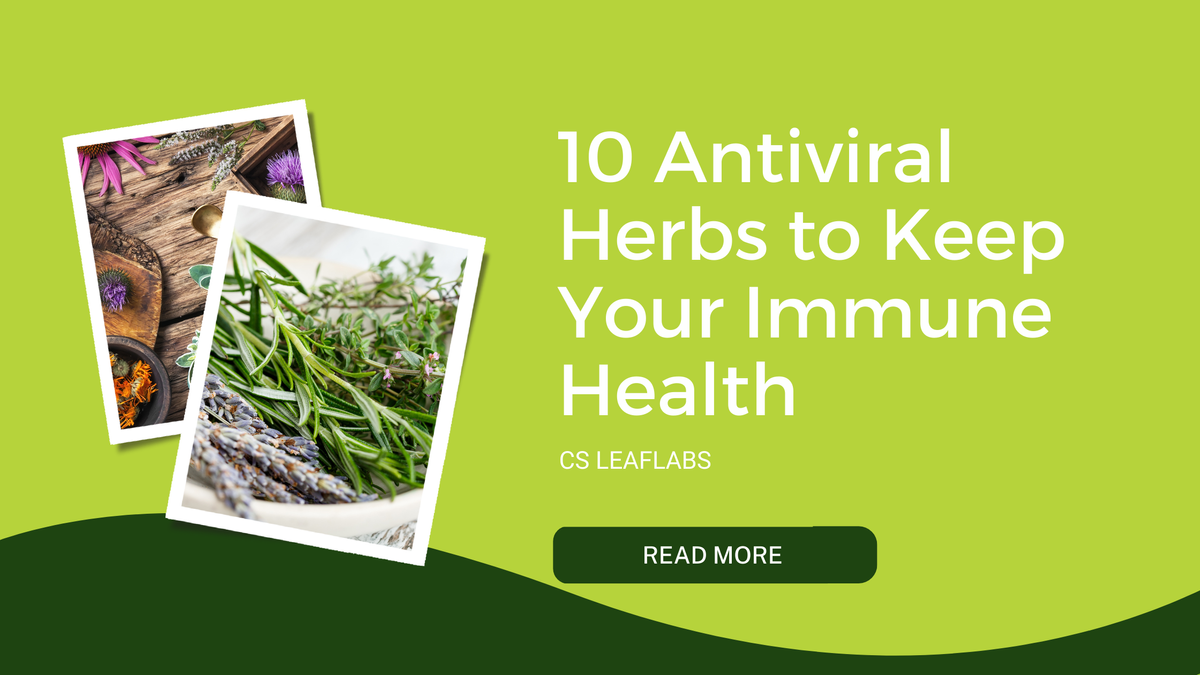
Viral infections play a crucial part in human diseases, and recent epidemics in the wake of globalisation and the ease with which people can travel have highlighted the importance of preventing them.
Synthetic antiviral drug toxicity and inadequate responses to resistant strains have fueled the hunt for more effective and alternative therapeutic options, including as plant-derived antiviral medicine compounds.
Over the past few decades, advanced scientific research has discovered many synthetic antiviral agents which are effective against many viral infectious diseases. Unfortunately, these synthetic drugs have been reported to produce countless adverse effects. In some cases, they may become ineffective on emerging viral resistant strains (Kurokawa et al., 2010)
Hence, the quest for novel antiviral agents focuses not only on synthetic combinations but also on the plant-derived metabolites. A variety of plant metabolites can impede viral replication without affecting the host physiology or with limited side effects (Martin and Ernst, 2003; Hussain et al., 2017). Medicinal herbs possess a variety of phytochemicals that harbour antiviral properties, which are advantages over conventional drug therapy due to their broad therapeutic potency and minimum or no adverse effects. (Sayantani Chanda et al.,2020)
1.Cassia Fistula
Cassia fistula L is an important medicinal plant used in many traditional medicinal systems including Ayurveda and Chinese Traditional Medicine.
The present review of Cassia Fistula pharmacological properties including antioxidant, antimicrobial, anti-inflammatory, anti-viral, antidiabetic, antitumor, hepatoprotective among other activities.
Cassia Fistula contains Ethanoic extract which significantly inhibited several viruses which include below list that clinically proven
Foot and Mouth Disease (FMDV)
Ranikhet disease
Vaccinia virus (VV)
Infectious Boive Rhinotracheitis (IBR) virus.
2.Boerhaavia diffusa
The whole plant or its specific parts (leaves, stem, and roots) are known to have medicinal properties and have a long history of use by indigenous and tribal people in India.
It possesses hepatoprotective, diuretic, anti-inflammatory, anti-stress and immunomodulation, antifertility, antimicrobial, antiviral and insecticidal activities
The aqueous extract of air-dried roots of Boerhaavia diffusa shows broad-spectrum antiviral activity and no phytoxic effects
3. Terminalia Bellerica
Terminalia bellirica fruit pericarp were found to be good antibacterial and antiviral activity
Terminalia bellirica fruit is a potential source for developing broad-spectrum antibacterial drugs against multidrug-resistant(MDR) bacteria, which are non-toxic to mammalian cells and impart health benefits by high antioxidant activity.
4.Terminalia Chebula
Terminalia chebula is rich sources of tannins and maximum amount was found in fruits. Besides this, it also contain good amount of other phytochemicals like flavonoids, tannins, sterols,fructose, amino acids, resin, fixed oils etc
It was found in early studies that the Terminalia chebula is active in protective activity against cytotoxic
It was also useful to fight against acute pulmonary infections which defended upper respiratory cells from influenza A virus
5. Amla
Amla is often reported for its various biological properties such as immunomodulatory, anti-inflammatory, antioxidant, anticancer, antiviral, anti-diabetic, antimicrobial, etc
Srikumar et al. (2006) reported that amla extracts increased the immune response and regulated the activities of superoxide dismutase, catalase and glutathione S transferase
Based on the previous reports available in literature and the results of the present in silico study, it can be implied that the bioactives of Amla could act as potential inhibitors for COVID-19 Mpro
6. Aerva Ianata
Aerva lanata is well known for its anti-microbial activity
The robustness of some of the phytochemicals such as ervoside, which is only present in Aerva lanata computed to have very high anticoronavirus activity
Besides phytochemicals from Aerva lanata and hydroxychloroquine in effective treatment of COVID-19 which is many of the alkaloids and flavonoids from this herb computed to be highly effective towards SARS-CoV-2
7. Curcuma Longa
Curcumin, the primary curcuminoid compound found in turmeric spice, has shown broad activity as an antimicrobial agent, limiting the replication of many different fungi, bacteria and viruses
Curcumin can act not only as an anti-fungal and anti-bacterial compound, but also as an anti-viral compound, inhibiting replication in a wide-range of viruses
Curcumin has already been demonstrated to inhibit SARS-CoV-1 replication,the coronavirus which caused the 2003 epidemic
Additionally, several molecular docking studies have been performed that suggest curcumin would be effective at inhibiting SARS-CoV-2 replication through interacting with the spike glycoprotein and inhibiting angiotensin-converting enzyme 2 (ACE2)
8. Mangifera Indica
Mango (Mangifera indica L.), which considered as a very common fruit belong to a certain kind of plants called Anacardiaceous
These fruits include a high percentage of antioxidant elements, which have been shown to reduce the risk of heart, cardiac, and cancer disease. They also have a high level of activity against viruses and germs, preventing them from multiplying.
The mangifera extract showed the highest antiviral activity against the influenza virus H9N2 propagated on tissue culture cells
9. Mesua Ferrea
The whole plant of M. ferrea is wildly used as medicinal plant in tropical Asia and India
Based on clinical studies it shows rhusflavanone and mesuaferrone B are the anti-virulence components from M. ferrea with inhibitory activity on the secretion of effector proteins on Salmonella
10.Embelia ribes
Study in 2018 shows the ethyl acetate extract of fruits of Embelia ribes Burm. f. (Myrsinaceae) had the highest antiviral activity
Embelin is the major component of Embelia ribes Burm (Myrsinaceae).
Embelin was further evaluated against a panel of influenza viruses including influenza A and B viruses that were susceptible or resistant to rimantadine and oseltamivir
Peer Review Journal Reference
1) Ruth W. Mwangi, John M. Macharia, Isabel N. Wagara, Raposa L.Bence,The medicinal properties of Cassia fistula L: A review,Biomedicine & Pharmacotherapy,Volume 144,2021,112240,ISSN 0753-3322, https://doi.org/10.1016/j.biopha.2021.112240.
2) L P Awasthi1 and H N Verma, Boerhaavia diffusa – A Wild Herb with Potent Biological and Antimicrobial Properties https://www.asianagrihistory.org/pdf/volume10/boerhaavia.pdf
3) Nagendraswamy G, Lakshmi Ranganatha V, Bushra Begum A, Prashanth T, Alghorbani M, Zameer F et al.Extraction and Evaluation of Antimicrobial and Antiviral Efficacy of Terminalia bellirica Fruits. Indo American Journal of Pharmaceutical Research 2013;3(4):4262-4268
4)Sayantani Chanda, Suparna Mandal Biswas and Prasanta Kumar Sarkar,Phytochemicals and antiviral properties of five dominant medicinal plant species in Bankura district, West Bengal: An overview Journal of Pharmacognosy and Phytochemistry 2020; 9(6): 1420-1427 https://www.phytojournal.com/archives/2020/vol9issue6/PartU/9-6-305-333.pdf
5) Murugesan S, Kottekad S, Crasta I, et al. Targeting COVID-19 (SARS-CoV-2) main protease through active phytocompounds of ayurvedic medicinal plants - Emblica officinalis (Amla), Phyllanthus niruri Linn. (Bhumi Amla) and Tinospora cordifolia (Giloy) - A molecular docking and simulation study. Comput Biol Med. 2021;136:104683. doi:10.1016/j.compbiomed.2021.1046836)Sherin, D.R., Sharanya, N. & Manojkumar, T.K. Potential drug leads for SARS-CoV2 from phytochemicals of Aerva lanata: a Machine Learning approach. VirusDis. 32, 757–765 (2021). https://doi.org/10.1007/s13337-021-00732-0
7) Praditya D., Kirchhoff L., Brüning J., Rachmawati H., Steinmann J., Steinmann E. Anti-infective Properties of the Golden Spice Curcumin. Front. Microbiol. 2019;10:912. doi: 10.3389/fmicb.2019.00912.
8)Wen C.-C., Kuo Y.-H., Jan J.-T., Liang P.-H., Wang S.-Y., Liu H.-G., Lee C.-K., Chang S.-T., Kuo C.-J., Lee S.-S., et al. Specific Plant Terpenoids and Lignoids Possess Potent Antiviral Activities against Severe Acute Respiratory Syndrome Coronavirus. J. Med. Chem. 2007;50:4087–4095. doi: 10.1021/jm070295s. [PubMed] [CrossRef] [Google Scholar]
9) Zahedipour F., Hosseini S.A., Sathyapalan T., Majeed M., Jamialahmadi T., Al-Rasadi K., Banach M., Sahebkar A. Potential effects of curcumin in the treatment of COVID-19 infection. Phytother. Res. 2020 doi: 10.1002/ptr.6738. [PMC free article] [PubMed] [CrossRef] [Google Scholar]
10)Maurya V.K., Kumar S., Prasad A.K., Bhatt M.L.B., Saxena S.K. Structure-based drug designing for potential antiviral activity of selected natural products from Ayurveda against SARS-CoV-2 spike glycoprotein and its cellular receptor. Virusdisease. 2020;31:179–193. doi: 10.1007/s13337-020-00598-8. [PMC free article] [PubMed] [CrossRef] [Google Scholar]
11)Abbasi K., Anjum N., Sammi S, Masud T., Ali S. Effect of coatings and packaging material on the keeping quality of mangoes (Mangiferaindica L.) stored at low temperature. Pakistan Journal of Nutrition, 2011; 10: 29-138.
12)Amin A. S. AL Rawi,Hajir Sh. H. AL Dulaimi and Marwa A. A. AL Rawi, Antiviral Activity of Mangifera Extract on Influenza Virus Cultivated in Different Cell Cultures, J Pure Appl Microbiol., 2019; 13(1):455-458 doi: 10.22207/JPAM.13.1.50
13)Xiaochun Zhang, Rongrong Gao, Yan Liu, Yuhe Cong, Dongdong Zhang, Yu Zhang, Xuefei Yang,, Chunhua Lu, Yuemao shen,Anti-virulence activities of biflavonoids from Mesua ferrea L. flower Drug Discoveries & Therapeutics. 2019; 13(4):222-227.
14)Hossan MS, Fatima A, Rahmatullah M, Khoo TJ, Nissapatorn V, Galochkina AV, Slita AV, Shtro AA, Nikolaeva Y, Zarubaev VV, Wiart C. Antiviral activity of Embelia ribes Burm. f. against influenza virus in vitro. Arch Virol. 2018 Aug;163(8):2121-2131. doi: 10.1007/s00705-018-3842-6. Epub 2018 Apr 10. PMID: 29633078
